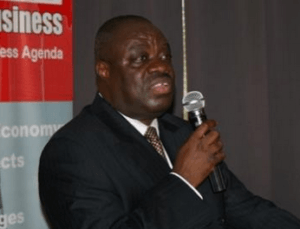Ghana government to increase funding for R&D – Minister

Government has decided to raise the level of funding for Research and Development (R&D) on Science, Technology and Innovation (STI) to a significant percentage of the nation’s gross domestic product (GDP).
Dr Ibrahim Mohammed Awal, Business Development Minister, said to this end, the President had pledged that a minimum of one per cent of GDP would be applied towards R&D, and this would be increased with time until it reaches three per cent of GDP.
“This will be the primary source of funding for the National Science, Technology and Innovation, which is being established to support the development of the STI system of the country,” Dr Awal said on Thursday.
He was speaking at the opening of the Annual Regional Meeting (ARM) of the Science Granting Councils Initiative (SGCI) in Sub-Saharan Africa and the launch of the Ghana Innovation and Research Commercialization (GIRC) Centre in Accra.
Dr Awal explained that the fund would be established as an autonomous body with oversight from the Ministry in-charge of STI.
The SCGCI seeks to strengthen capacities of Science Granting Councils (SGCs) in Eastern, Southern, Central and West Africa in order to support research and evidence-based policies that would contribute to economic and social development.
It is jointly funded by the United Kingdom’s Department for International Development (DFID), Canada s International Development Research Centre (IDRC), and South Africa s National Research Foundation (NRF).
The SGCI member countries include Ghana, Kenya, Rwanda, Uganda, Tanzania, Ethiopia, Côte d’Ivoire, Burkina Faso, Senegal, Zambia, Mozambique, Malawi, Namibia and Zimbabwe.
The Accra meeting, from July 4-6, is being hosted jointly by the African Technology Policy Studies (ATPS) and the Ministry of Environment, Science, Technology and Innovation (MESTI) on the theme “Research and Innovation for Job Creation.”
The GIRC-Centre would be equipped to provide support services that will anticipate the challenges faced consistently by researchers and innovators in their attempts to commercialize, and to assist them to avoid the pitfalls associated with those challenges.
It is also expected to work with key policy making institutions to develop policies, strategies, guidelines and legislations in promoting innovation, technology transfer and commercialization of research outputs.
The Centre is envisaged to be operated as a quasi-independent corporate body, with oversight responsibility by MESTI.
Dr Awal said the government had decided to place STI at the centre of the nation’s socio-economic development.
“As a nation, we have come to realise that ‘the Poverty Gap is the Technology Gap’, we have started the process of closing this gap as quickly as we can.”
The Minister said MESTI was launching the GIRC-Centre as the new partnership between Government, public research institutions, tertiary institutions and the private sector.
Dr Awal said it was the strategic platform that MESTI was creating to facilitate to facilitate an active, ongoing engagement among stakeholders and to provide guidance and support services that would help researchers and innovators to avoid the pitfalls associated with the processes of commercialisation.
He said to ensure that the STI System of the country receive uninterrupted attention from the highest office in the land, a Presidential Advisory Council on Science, Technology and Innovation (PASTI), was being set up as an independent advisory body, with a broad mandate to advice the President on issues related to STI.
Mrs Levina Owusu, the Chief Director, MESTI, said for Ghana and Africa to achieve the goals in the African Union Agenda 2068, as well as he Sustainable Development Goals (SDGs), STI must be placed at the centre of development by supporting research-based policies that would contribute to socio-economic development.
Dr Nicholas Ozor, Executive Director, ATPS, said he was happy that Ghana is the only Anglophone member country of the SGCI, and he was hopeful that Nigeria would soon join it.
He also urged ECOWAS to use Ghana as a case study to appeal to other member states to join the initiative.
Dr Roland Kouakou, Head of the Division of Science and Technology, and Principal Programme Officer, Department of Education, Culture, Science and Technology, ECOWAS Commission, said the ECOWAS Commission attaches great importance to the STI, because it plays a crucial role in the sub-region’s socio-economic development.
Mr Emmanuel Kyeremanteng Agyarko, the Member of Parliament for Ayawaso West Wuogon, who chaired the function, said STI had worked in other continents and it would also work in Africa.
Source: GNA
